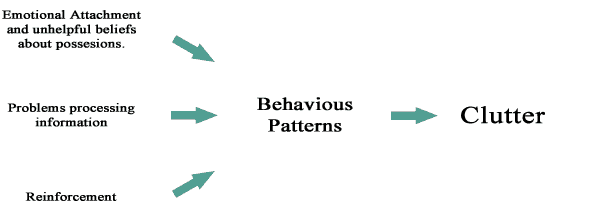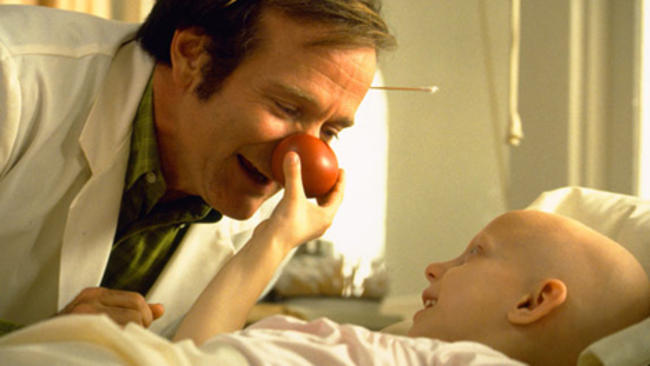
by Madeleine | Aug 24, 2017 | Positive People

“It’s not about deciding what I do or don’t need.
It’s not even about knowing what I should or shouldn’t keep.
It’s about understanding what I can handle.”
-Dana White
Hoarding is as old as time. In ancient times if you got tired of the clutter, you simply buried it. Archaeologists would probably agree with the adage “ One man’s trash is another man’s treasure.” On a serious note, people have very different ideas about what it means to have a cluttered home. For some, it may be a small pile of belongings in a corner of an otherwise well-ordered room. For others, when there is only a small narrow pathway between one room or another may still be considered OK, and in extreme cases, this attachment with access issues continues throughout the house. This is when hoarding ‘extremism’ comes into its own. In a r percentage of situations the attachment to ‘things’ goes beyond the house to swallowing up space in the backyard and/or front yard.
What is the diagnostic criteria for Hoarding Disorder?
- Persistent difficulty parting with or discarding possessions, regardless of their actual value.
- The difficulty is due to a perceived need to save the items and to avoid the stress associated with discarding them.
- The difficulty of discarding possessions results in further accumulation of possessions that congest and clutter active living areas. In so doing the clutter compromises the intended use of those areas. Often it is only through the intervention of a third party (family members, cleaners, or authorities) that the matter is addressed.
- The hoarding causes clinically significant distress or impairment in social, occupational, or other important areas of functioning (including keeping a safe environment for self and others).
- That the hoarding is not caused by another medical condition (e.g., brain injury, cerebrovascular disease, Prader-Willi syndrome).
- The hoarding cannot be explained by symptoms of another underlying mental disorder (e.g., Obsessive-compulsive disorder, lowered energy in major depressive disorders, delusions in schizophrenia or another psychotic disorder, cognitive deficits in major neurocognitive disorder, restricted interests in autism spectrum disorder).
The most frequent form of acquisition is excessive buying, followed by attainment of free items (e.g., leaflets, papers, items left on the curbside for collection).
When does hoarding begin?
Hoarding appears to begin early in life and continues well into the late stages. The symptoms may first emerge around ages 11-15 years, and start interfering with the person’s everyday functioning by the mid 20’s, and causes significant impairment / problems by the mid 30’s. In a nutshell, hoarding continues increasing with each decade of life.
What are the other risk factors?
Temperament: indecisiveness is a prominent feature of individuals who hoard. Anxiety may also be another contributing factor.
Environment: individuals with hoarding disorder often retrospectively report stressful and traumatic life events prior to the onset of the disorder or which caused the hoarding to become worse.
Genetic and physiological: Hoarding is familial (starts in families), with about 50% of individuals who hoard reporting having a relative who also hoards (or hoarded).
Cultural: Data suggests that hoarding is a universal phenomenon with consistent clinical features.
Gender related Diagnostic Issues: both sexes are represented, but females tend to display more excessive acquisition, particularly excessive buying, than do males.
Trauma: Traumatic events exacerbate hoarding as a coping mechanism.
Social isolation: Hoarders are often socially withdrawn and isolated with hoarding seen as a type of comfort.
Research continues. In a world awash in anxiety, fear, worry and accumulation of things as a type of coping mechanism, the need to manage feelings by accumulating items continues to grow. Hoarding doesn’t just include inanimate objects, but can include animals. E.g., dogs, cats, birds, the list is endless.
“A human being has a natural desire to have more of a good thing than he needs.”
– Mark Twain
What can be done to address hoarding disorder?
Psychotherapy, also called talk therapy, is an effective treatment. Cognitive Behaviour Therapy in particular has been shown to be very successful. Seek out a qualified and reputable therapist with experience in treating hoarding disorder.
As part of cognitive behavioural therapy, you may:
- Learn to identify and challenge thoughts and core beliefs related to the acquiring and saving of items. What are the thinking errors.
- Learn to question and resist the urge/need to acquire more things.
- Learn to organise and categorize possessions to help you decide which ones to keep and which to discard. “The decluttering process.”
- Work on and improve your coping and decision-making skills.
- Use in-home visits by a therapist or professional organizer to help you declutter your home.
- Reduce the isolation and increase social involvement with more meaningful activities.
- Learn strategies to enhance motivation for change.
- Use periodic visits/ongoing treatment to keep you on track and reinforce healthy habits.
- Treatment may involve assistance from family, friends and agencies to help with the removal of clutter. This is particularly the case for the elderly who may be struggling with medical conditions that make it difficult to maintain momentum or motivation.
What are some self help strategies for Hoarding Disorder to place in the toolbox?
- Get the facts about stress and anxiety. Both are a matter of managing rather than elimination in your life. The resources you rely on are both internal (thoughts and feelings) and external (friends, family, environment) and how we interact with these.
Once you can identify the triggers (event), and name the problem (thoughts, feelings, behaviours), you can begin to deal with it (interventions).
- Learn about hoarding. It’s about acquiring stuff, getting rid of existing items, both of which lead to feelings of anxiety and extreme distress. It may reduce contact with the outside world, impact on employment, and general functioning for the person.
- Build a toolbox of strategies. Understand the factors that add to your hoarding problem. What are the reasons? Is there the sentimentality aspect, the guilt in not giving away ‘family heirlooms’, the related beliefs attached to personal items. Perhaps your family had strong views about waste versus use. Many people struggle with decision making, categorization, and poor problem solving.
With this struggle in play certain behaviour patterns occur and are reinforced. Consider the following:
 Get motivated – it needs to be cultivated. Identify your thoughts and beliefs. Look at the reasons to change your behaviour. What will you gain?Look to the future. What will your life be like? If you don’t change what will happen? Get Organised: Baby steps, measurable goals, avoid distractions, be flexible. Be systematic – use the OHIO principle. “Only Handle It Once”.
Get motivated – it needs to be cultivated. Identify your thoughts and beliefs. Look at the reasons to change your behaviour. What will you gain?Look to the future. What will your life be like? If you don’t change what will happen? Get Organised: Baby steps, measurable goals, avoid distractions, be flexible. Be systematic – use the OHIO principle. “Only Handle It Once”.
a. Handle
b. Determine its outcome
c. Place into a category/location.
The locations/categories may consist of :
Area 1 – Keep
Area 2 – Sell
Area 3 – Charity
Garage sales using the help of good friends can earn you some cash to put towards a well deserved holiday, or boost your funds for creative endeavours.
The money could go towards relieving the stress of unexpected bills and then there are the gifts to charity; volunteers will welcome donations. There are some wonderful books and tips by the declutter expert, Peter Walsh. Peter’s hints are easily accessible on the internet. He is an empathetic man who understands the milestones – the highs, lows and the passing down of family memories/memorabilia. A good book of his is…Let it Go. Downsizing Your Way to a Richer, Happier Life. Peter Wash…2017
- Continue to practise your successes. Managing Hoarding Disorder take hard work and commitment. Take some time to give yourself credit for a job well done. Be kind to yourself as you take those small steps to change. Practice your new-found skills, and remember, there are people out there in your community who can help you in the journey to change and wellbeing.
“Simplicity. Identify the essential.
Eliminate the rest.”
– Leo Babauta

by Madeleine | Aug 24, 2017 | Positive People
Go placidly amid the noise and haste,
and remember what peace there may be in silence.
As far as possible without surrender
be on good terms with all persons.
Speak your truth quietly and clearly;
and listen to others,
even the dull and the ignorant;
they too have their story.
Avoid loud and aggressive persons,
they are vexations to the spirit.
If you compare yourself with others,
you may become vain and bitter;
for always there will be greater and lesser persons than yourself.
Enjoy your achievements as well as your plans.
Keep interested in your own career, however humble;
it is a real possession in the changing fortunes of time.
Exercise caution in your business affairs;
for the world is full of trickery.
But let this not blind you to what virtue there is;
many persons strive for high ideals;
and everywhere life is full of heroism.
Be yourself.
Especially, do not feign affection.
Neither be cynical about love;
for in the face of all aridity and disenchantment
it is as perennial as the grass.
Take kindly the counsel of the years,
gracefully surrendering the things of youth.
Nurture strength of spirit to shield you in sudden misfortune.
But do not distress yourself with dark imaginings.
Many fears are born of fatigue and loneliness.
Beyond a wholesome discipline,
be gentle with yourself.
You are a child of the universe,
no less than the trees and the stars;
you have a right to be here.
And whether or not it is clear to you,
no doubt the universe is unfolding as it should.
Therefore be at peace with God,
whatever you conceive Him to be,
and whatever your labors and aspirations,
in the noisy confusion of life keep peace with your soul.
With all its sham, drudgery, and broken dreams,
it is still a beautiful world.
Be cheerful.
Strive to be happy.
– Max Ehrmann

by Madeleine Baldissera | Sep 15, 2015 | Positive People

Laughter and a sense of humour can get you through the most challenging of times. As well as being our birthright, it’s a natural part of life that is innate. Observe a baby and you will see them begin smiling during the first few weeks of life and laugh within months of being born.
Practising emotional sharing builds strong and lasting relationships and laughter is one of the most effective ways of keeping relationships fresh and exciting. This works in our love relationships as well as in our connections with co-workers, family members, and friends.
By sharing laughter and humour it allows us to:
- Express our true/inner feelings
- Reduce inhibitions
- Avoid defensiveness
- Be more spontaneous
The human race has one really effective weapon and that is laughter – Mark Twain
Did you know that humour and laughter can help tackle age-related memory loss by reducing brain damage caused by the ‘stress hormone’ cortisol and boost memory? According to Michael Miller, Director of the Centre for Preventative Cardiology at the University of Maryland Medical Centre in Baltimore, “A good belly laugh leads to the release of endorphins from the brain.”
A study in Japan found that laughter could improve anti-inflammatory factors in the blood of people who have rheumatoid arthritis. Another study published in 2003 showed that those who laughed (at a humorous movie) had higher levels of natural killer cell activity which increased the participants ability to fight off disease. However, the effect was only seen in the subjects who laughed out loud, not in those who quietly watched the comedy.
Laughter is the shortest distance between two people. – Victor Borge
By setting aside special times to seek out humour and laughter you will begin to incorporate both into the fabric of your life, finding it naturally in everything you do.
Some ways to start:
- Smile – Smiling is the beginning of laughter.
- When you hear laughter be drawn to it.
- Spend time with playful, fun people. There are people who laugh easily – both at themselves and at life’s absurdities, and who routinely find humour in everyday events.
- Bring humour into your conversations. Everyone has a moment in the day/week or their life where something funny has happened. Share those moments.
- Count your blessings. Consider the good things in your life and remember the good rather than fixating on the sad/bad.
As humour and laughter become a part of your life, your creativity will bloom and new discoveries will await you. Humour will take you to a higher place where you can view the world from a more relaxed, positive, joyful, creative and balanced perspective.
The link between laughter and mental health:
- Laughter helps you relax and recharge by reducing stress, increasing energy, keeping you focused and accomplishing more.
- Laughter dissolves distressing emotions – when laughing you can’t feel anxious, angry or sad.
- Humour changes your perspective allowing you to see situations in a more realistic, less threatening light. By creating psychological distance (through humour) your reduce the chances of feeling overwhelmed.
- Humour and laughter in our communication with others strengthens our relationships, triggering positive feelings and fostering emotional connection.
A laugh is..
A smile that bursts
An instant vacation
A day not wasted
Music to the soul
A cheap medicine
The more you laugh,
the more you live
Ways to assist you see the lighter side of life:
- Surround yourself with reminders to help you see the light side. Place a funny toy on your desk or in your car. Hang a funny poster in your office. Frame pictures of you and the family having fun. Choose a computer screen saver that makes you laugh. Carry a photo in your wallet/handbag of your loved ones laughing.
- Learn to laugh at yourself. This will help you to not take yourself too seriously.
- Keep things in perspective. There are many things in life that are beyond our control, particularly how others behave.
- Manage stress. Stress is a major obstacle to humour and laughter.
- Observe children and emulate them. Find the child within. Children are experts at taking life lightly, enjoying laughter and ensuring there is always time to play.
- Attempt to find the positive/humorous facets in situations. Look for the lighter side of a negative situation, and uncover the irony and absurdity of life. This will enhance your mood and the mood of those around you.
At the height of laughter, the universe is flung into a kaleidoscope of new possibilities. – Jean Houston

by Madeleine | May 24, 2015 | Positive People
 Contrary to popular belief and theoretical underpinnings of grief and bereavement, there is now an (overdue) acceptance that there is no ‘one-size-fits-all’ approach to grief and bereavement. It is as individual as the people who experience the loss. It is my intention to discuss the process of grief and bereavement gently, and to bring some current thinking to this very heartfelt topic.
Contrary to popular belief and theoretical underpinnings of grief and bereavement, there is now an (overdue) acceptance that there is no ‘one-size-fits-all’ approach to grief and bereavement. It is as individual as the people who experience the loss. It is my intention to discuss the process of grief and bereavement gently, and to bring some current thinking to this very heartfelt topic.
In the past there was the long held view that grief followed a predictable emotional path from distress to ‘recovery’. Kubler-Ross (1969) talked about the five stages of grief, ie. Denial, Anger, Bargaining, Depression, and Acceptance. There was the idea that successful grieving required ‘letting go’ of the deceased/loved one. It is important to recognise that Kubler-Ross was describing the process she observed in terminally ill individuals in coming to terms with their pending deaths. She was not talking about survivor grief.
Changes in theoretical ideology supported by recent research suggests that grieving should be considered as an active process involving four tasks: (1) accepting the reality of the loss, (2) processing the pain of grief, (3) adjusting to a world without the deceased/ loved one (both internally, externally and spiritually), and (4) finding an enduring connection with the deceased/loved one in the midst of embarking on a new life. (Worden, 2008).
Into the mix of emotional challenges a number of factors are critical in understanding the grief/bereavement process. These include…
- Who was the person to the bereaved?
- The nature of attachment/closeness to the bereaved
- How the person died
- Historical antecedents (place in the family/connection)
- Personality variables, ie, factors
- Social mediators, ie, social interaction, place in social connections
- Concurrent stressors – a number of stresses happening at the same time
It is now argued that after a death, bonds with the deceased do not necessarily have to be cut, and that there is a potentially healthy role for maintaining an ongoing bond with the deceased/loved one. By doing this there is the knowledge that death ends a life, not necessarily a relationship. Instead of saying goodbye or seeking ‘closure’ there exists the possibility of room for the deceased/loved one to be both present and absent. The relationship remains a personal one where talking to the deceased is seen as a spiritual connection. This may also be experienced through dreams, visiting the grave, feeling their presence or through creating and participating in rituals that maintain the links with the deceased. When considering this response to grief/bereavement, an important factor as to whether the grieving has become complicated is whether the expression reflects an attempt to maintain a more ‘concrete’ tie where there is a refusal to give up the presence, or regain physical closeness to the deceased/loved one.
Across a variety of different losses, research suggests that the failure to find meaning following the loss, especially in terms of trying to make sense of the death itself, may lead to higher levels of complicated grief symptoms. This is where the grief/bereavement process is protracted and usually accompanied by losses that are unexpected and premature.
Mark Twain, when asked about the loss of his daughter, responded…
“that to attempt to communicate about such a loss would bankrupt the languages of the world.”
Many years ago, Viktor Frankl, a highly regarded psychiatrist and author based his research and writings on his experiences as a concentration camp inmate (WW II) and man’s search for meaning. He believed that the need to find meaning in life (and death) through personal experiences is a search that is universal. So, in the face of loss of a loved one, this is what is sought. For many the effort to make sense of death can be fruitless. Instead, the focus becomes one of trying to make sense of life, learning how to focus on and force something positive to come from the life of the deceased and the legacy he/she left behind and honouring that life.
20 Tips on working with Grief and Bereavement
1. It takes time to work through your grief.
Grief takes up your energy physically, emotionally and psychologically. Grief requires time, lots of time. One to two years is not a long time in allowing time to work through grief. There are the memories, meanings and finding a way through this painful process.
2. It’s OK to enter the emotions of grief.
It is natural to want to avoid painful emotions. In losing a loved one, you deserve to allow yourself to feel the full range of emotions – sadness, anger, feelings of intense longing, guilt and others.
3. I’ll get by with a little help from my friends.
Talk about your loss with friends, family, and mental health care professionals. As has been pointed out…
”Grief is a process, not an event.”
4. Keep a check on your health.
Bereavement is a time of taking care of yourself as grief takes a toll on you emotionally and physically. You have been wounded on a number of levels. Grieving places a heavy burden of stress on your body. It can cause sleep disturbances, weaken the immune system and exacerbate health problems. Give yourself time and space to begin the healing process. Rest, healthy eating, and ‘time out’ are essential in your recovery.
5. Alcohol and substance abuse only mask the pain.
Try and resist the temptation to take drugs or use alcohol to numb your pain. These can interfere with the grieving process by delaying it or masking the pain. Where depression is being experienced, alcohol can make the situation worse.
6. Keep in touch with your Doctor.
Ensure you see your doctor regularly to have health check-ups. He/she will monitor any existing health problems, prescribed medications and adjust them according to your needs; for example, blood pressure, insomnia, anxiety, depression and the like. Sometimes short term medication may be needed to assist you in the recovery process.
7. It’s complicated
Having mixed emotions (involving positive and negative feelings), especially in situations where issues remain unresolved after an argument or physical/emotional absence complicates the grieving process. There will be feelings of remorse, guilt, anger and so much more that comes into play where sudden death has occurred. Sharing these feelings with a mental health professional can help.
8. One step forward then one step back.
The grief process often includes some setbacks. Be patient with yourself and others. Grief cannot be considered as a linear process. There will be twists and turns. Trying to set deadlines in matters of grief is unrealistic.
Reminders, being task focused, and placing grief on the backburner, may hinder the healing process.
9. Stuck in the well of grief.
If feeling stuck with no way out of your grief, consider a new approach. Trying to avoid pain is a very normal reaction, however, if immobilized, try to ‘kick start’ the grief/bereavement process by visiting and reviewing personal memorabilia. For example, looking at photo albums, home videos and movies containing happy images of your loved one. Do talk about your loved one especially at those occasions where his/her absence will be felt. It is a positive opportunity to share and provide mutual support.
10. Rituals and Traditions are a part of life.
Our lives are enriched by personal and family rituals; those special occasions that we share with loved ones. There is no greater way to honour our loved ones than to continue the traditions that bind us. It also opens the door to create new ones that will continue to strengthen the ties of the past, present and future. This is the ending of one phase of our lives and the beginning of a new one. Create a legacy.
11. There’s the saying “Misery loves company”
By seeking others that have been through grief and bereavement you can gain a greater insight into how people cope with loss. There is the mutual sharing and empathy that introduces the truth that ‘death is part of life.’
No one escapes this life without the experiences of grief and loss.
12. Connect with your spirituality.
With death there is the question of why. Use your own sense of spirituality to explore what death or loss means to you and your spiritual self. Pray, meditate and spend time with nature. Mindfulness practices help us stay in the moment and to accept that our existence is one of impermanence.
13. Grief affects people differently.
Some people let everybody know how they are feeling; others don’t like to make a fuss. Women and men are treated differently in society. With this in mind, they may express their grief differently. Culturally, different nationalities, cultures and religions see death, loss and grief in a specific way, based on their own beliefs and view of the world.
14. Children know!
Once again, there is no timetable to grief/bereavement as it is such a personal journey, but it does sometimes pay to listen to the concerns and observations of people around you. Don’t hide your grief from others who are about you, especially your children. By hiding your grief you may be conveying a message to them that it is wrong to grieve openly, or to ‘inflict’ your grief on other people. Children need to know that grief is OK.
15. No guilt in having fun or laughing.
It is not unusual for someone who has suffered the loss of a loved one to feel guilty for laughing or having fun, or enjoying anything. Would your loved one want you to not laugh, to not have fun? Would you wish that on them if the situation was reversed? Of course not. What you are doing is honouring the life of your loved one. When your loved one was alive, you shared laughter, joy and life. This is their/your legacy.
16. Keep in touch.
One of the greatest things we can do for ourselves and to honour our loved one is to stay in touch with the people you both shared your life with. Be prepared to reach out because they have lost someone dear to them too. This is particularly the case as the population ages and the numbers of friends dwindle.
17. We are bound by attachments in life.
At some point those who have lost their partner may face the decision of whether to be open to a new relationship. If one considers the situation reversed, that is, if you died and your partner survived, what would you want for them? It may help you to see your situation from this angle.
18. To move or not to move.
It’s usually not a good idea to make major life changing decisions in the first 6 – 12 months after a loss. It is often better to delay such thoughts until your life is back in balance again.
19. Change is inevitable.
When it feels right start something new. It is part of the healing process and you are not dishonouring the memory of your loved one by rejoining the world. If anything, they would applaud your taking that step forward (as would you if the circumstances were reversed.)
20. To everything there is a season.
Every time must come to an end – the pleasant, the unpleasant, ugly or beautiful, wholesome or evil – because of the inherent nature of the universe. Life is about endless change. It is precisely that which enables new things – loves, children, sunrises, teachings, pleasures – which also brings their endings. And our losses. (R. Hanson, 2007)
“We never get a choice about who will die in our lives. But we do get to choose what to do with our memories. … By turning our feelings…into something we can touch, explore, and treasure, we transform our grief so that it bring us new understanding, new strength.” – Part of Me Died, Too. (1995) Virginia Lyn Fry

by Madeleine | May 3, 2015 | Positive People
 Stress is an everyday occurrence, but when there is prolonged stress it can affect physical and mental wellbeing. Stress is often viewed as ‘that word’ and all the negatives associated with it…juggling family commitments, business deadlines, financial constraints, and stretching ourselves too thinly across a number of areas in our demanding lives. On the positive side, stress can be a motivator for prioritizing and creative task management; to push ourselves in reaching our full potential.
Stress is an everyday occurrence, but when there is prolonged stress it can affect physical and mental wellbeing. Stress is often viewed as ‘that word’ and all the negatives associated with it…juggling family commitments, business deadlines, financial constraints, and stretching ourselves too thinly across a number of areas in our demanding lives. On the positive side, stress can be a motivator for prioritizing and creative task management; to push ourselves in reaching our full potential.
As long as the gap between perceived ability to cope and demands of the task is not too overwhelming.
It is important to identify between good and bad stress, and to use them to your advantage.
Good Stress is for survival and part of our ancestral legacy. Such stress is referred to as “Eustress” which stimulates us to get things done. By adding fuel to the fire and keeping our thoughts in response mode we are ready to meet the challenges of everyday life.
Bad Stress is when we become overwhelmed by the tasks and demands confronting us. By adopting negative coping strategies such as too much caffeine, alcohol, and drugs we enter the area of distress and potential burnout. As a result of bad choices in coping strategies and elongated periods of stress, we may also end up with anxiety, high blood pressure, loss of sleep, unforeseen aggression and so many other psychological and physical symptoms.
Optimal Stress is where we maintain a healthy balance between keeping busy “Eustress” and overworking “Distress” and reaching peak performance without suffering as a consequence.
It is probably timely to look more closely at the types of stress, symptoms and causes of stress.
Types of Stress:
- Eustress – the good stress which comes from facing challenges in a positive way where we are excited and motivated to reach optimal performance.
- Acute Stress – this is where stress is experienced for a small period and related to a specific situation.
- Episodic Acute Stress – This is where there is a cumulative effect of one thing after the other and it becomes harder to recover.
- Chronic Stress – Where pressures and demands are ongoing over a long period of time with perceived little chance to initiate recovery. This type of stress can be damaging to your physical/psychological wellbeing, emotional health and relationships.
Symptoms of Stress:
Psychological
- Feeling overwhelmed
- Angry / irritable
- Teary / moody
- Anxiety / Depression
- Concentration problems
- Lower confidence / Self esteem
Physical
- Tiredness/fatigue
- Aches and pains
- Diarrhoea, stomach upset
- Disturbed sleep
- Headaches
- High Blood Pressure
- Weakened immune system
- Muscle tension
- Change in sex drive
Behavioural
- Alcohol, drug abuse
- Outbursts of anger
- People avoidance
- Social/relationship difficulties
- Over/under eating
- Frustration, confusion, giddiness
- Lethargy, lack of interest, loss of appetite
Causes of Stress:
The circumstances leading to stress (stressors) affect people in a host of different ways. What affects one person may not necessarily affect another.
The major causes of stress include…
• Trauma – life threatening events or violent situations. While most people recover, some go on to develop PTSD (post traumatic stress disorder)
• Routine stress – this is everyday life stress around work, parenting etc.
• Major life events – both the negative and positive events experienced in life – marriage, having children and parenting, illness, death in the family, divorce.
• Other factors – depending on the degree of difficulty experienced include…
financial difficulties, personal health concerns, family and workplace issues.
“Maturity is achieved when a person accepts life is full of tension.” – Joshua L. Liebman
20 Tips on Accepting and Managing Stress
1. Learn to recognise and monitor stressors.
Identify the stress triggers that affect you on a daily basis. Pay attention to the warning signs which may include irritability, muscle tension and tiredness. Come up with an action plan for handing stressful situations.
2. Put together a step-by-step coping plan.
By being pro-active you will feel more in control. Make a list of the important things or tasks you need to deal with on a daily basis. Try to follow the list so you stay on top of demands. Remember to keep your expectations realistic and outcomes achievable.
3. Change the stressor.
There may be some stressors that are beyond your control, whilst there are others that you can do something about. For example, if you are experiencing stress in the workplace, you may be able to alter your job duties, location or hours. Sometimes we need to be creative in our plan of action. If you are unsure how to go about resolving this issue, discuss it with someone whose opinion you value possibly in the same or related field and who can be objective.
4. Start keeping a daily stress journal.
By keeping a journal the benefits are fourfold. One, you identify how much stress you are under. Two, you start to recognise the stress triggers. Three, you begin to think about constructive ways of addressing the stress in your life. Four, over time you begin to identify a pattern which will help you to circumvent some stresses and also identify healthy management practices to minimise future stressors.
“There are thousands of causes for stress, and one antidote to stress is self-expression. That’s what happens to me every day. My thoughts get off my chest, down my sleeves and onto my pad.” – Garson Kanin
5. Learn to say no without feeling guilty.
We all have a limit to what we can achieve responsibly and effectively.
Not only will ‘No’ empower you but it will also ensure people respect your boundaries, appreciate your time and that your availability is not limitless nor to be taken for granted. Remember to be firm but polite. If this idea seems foreign then practice saying ‘No’ in the mirror which will help you gain confidence. Another thing, don’t explain why you are saying no – explanations are subject to requirement.
6. Organisation is the name of the game.
There is nothing more frustrating than being disorganised. Set into place filing systems, boxes, de-clutter and keep a diary. Establish routines that help you stay on top of tasks.
7. Plan leisure activities into your life. Reward yourself daily.
Ever heard the expression “All work and no play makes Jack a dull boy?” It is important to gain some perspective and relief from the daily grind of work and commitments. Additionally, it helps to have something to look forward to. Your ‘treats’ and time out from daily demands don’t always have to be big. It can be the little things that add a little sweetness to your life.
“There must be quite a lot of things that a hot bath won’t cure, but I don’t know many of them.” – Sylvia Plath
8. Exercise is great for relieving stress.
By incorporating exercise into your routine (be it daily or twice weekly), your heart and lungs will thank you for it. Ideally, exercising for a minimum of three days per week for 15-30 minutes will be most beneficial. However, any exercise is better than none. In the process of exercising you release endorphins into your body which promote positive health and wellbeing.
9. Time out – rest yourself.
There is only so much that the body and mind can absorb at one time. By having regular breaks, say 10 minutes every hour, you will recharge your body and mind. Find somewhere quiet, or enjoy a natural setting such as a park or your backyard. Rest your eyes and allow the quiet to wash over you. Feel the breeze on your skin, the warm sunshine and listen to the sounds around you. When possible indulge in 7-8 hours of restful sleep each night.
10. Concentrate on breathing and positive thoughts.
Introduce relaxation techniques and activities that will help lower stress levels. Consider meditation, listening to your favourite music, yoga, tai chi, cycling, dancing or walking to bring about body awareness and breath control. Make this time enjoyable and remember to communicate with friends and loved ones.
11. You are what you eat.
This is not just about weight control but rather the importance of maintaining good nutrition. A balanced diet includes meat, vegetables, fruit and avoiding foods high in fat and sugar. By limiting caffeine, alcohol and processed foods our bodies are able to work efficiently to ensure sustained energy throughout the day.
12. Check the environmental causes.
We live in a stressful world where we are experiencing unprecedented demands of our talents, time and energy. It is essential that we recognise the negative and positive social/environmental impact on our lives. By controlling who and what surrounds us, we are better able to manage stress and seek the support that is needed to help us through the daily challenges that confront us all. Be a gate-keeper to your personal health and wellbeing.
Be selective so that your environment at work, home, leisure are in line with your personal needs and desires.
13. Monitor your health
Be aware of distress signals that may mean you’re heading for troubled waters. Symptoms may include headaches, insomnia, anxiety, lack of concentration, excessive tiredness, colds/flu, loss of appetite, over-eating.
Remember, these signs may mean that something else might possibly be going on which may require medical attention. For example, hypertension, heart disease, high blood pressure, ulcers etc.
14. Introduce and practice positive self talk.
Acknowledge and celebrate the individual that you are. Eliminate destructive self talk such as…”I’m too old…,” “I’m too fat…,” “I haven’t the skills…”
Focus on your strengths and the positives in your life.
15. Become more assertive.
You are in charge of your own destination in life. By dealing with challenges head on, you will begin to be more assertive and focused on the priorities in your life.
16. Be open to compromise.
By being flexible we open ourselves up to the potential and possibilities that exist around us. The middle ground rather than the extreme right or left offer us opportunities to act without setting ourselves up for a fall.
17. Express yourself.
Rather than bottling up your feelings, if someone is bothering you, communicate your concerns in an open and respectful manner. By remaining quiet and not voicing your feelings, resentment will set in and frustration will escalate. Nothing can change unless you begin to communicate effectively.
18. Consider the big picture.
Take some perspective to the issue or situation at hand. Now ask yourself just how important this issue will be in the long run. Is it worth being upset over? What are the chances of it being a concern in a month or in a year?
Focus your energy, attention and time on something else which will be more productive.
19. Keep your sense of humour.
Foster the ability to laugh at yourself. The act of laughing at yourself and seeing the humour in events or situations around you helps your body to fight stress in very effective ways.
20. Respect yourself and learn to forgive.
By accepting that we live in an imperfect world and that people make mistakes, we will not be so judgemental of ourselves. By moving on we continue to respect ourselves and others as we all journey through this world of joy and tribulation. The choice of the terrain is ours alone as it depends on our attitude to challenges that arise.
“If you are distressed by anything external, the pain is not due to the thing itself, but to your estimate of it; and this you have the power to revoke at any moment.” – Marcus Aurelius

by Madeleine | Apr 25, 2015 | Positive People
 This may seem a strange heading. Positive people coping with depression? Yes, we can still remain positive, focused and participate in life. While depression is an illness that causes feelings of sadness, tiredness and lack of interest in many aspects of our daily, social and working life, it does not define who we are. Depression can be a persistent and powerful seductress that needs to be met head on in a well planned line of attack.
This may seem a strange heading. Positive people coping with depression? Yes, we can still remain positive, focused and participate in life. While depression is an illness that causes feelings of sadness, tiredness and lack of interest in many aspects of our daily, social and working life, it does not define who we are. Depression can be a persistent and powerful seductress that needs to be met head on in a well planned line of attack.
20 tips on combating Depression
1. Know your enemy.
There are many signs for depression and knowing the signs and symptoms
will work in your favour. Here are the signs…
• Tiredness, lethargy, fatigue
• Persistent sadness, easily reduced to/uncontrollable tears
• Sadness and experiencing ‘the blues’ over a two week period and longer
• Feeling useless, worthless, loss of self esteem, self blame
• Sleeping more, sleeping less, disturbed sleep patterns, insomnia
• Weight loss or gain, binge eating or loss of appetite
• Forgetfulness and feeling your mind’s ‘in a fog’
• Headaches, nausea, body pains
• Irritability, Restlessness
• Suicidal thoughts
2. Visiting your Doctor to rule out any underlying medical conditions.
Medical conditions may include…
• Vitamin deficiency, medication side effects
• Alcohol and drug addiction
• Genetic links to depression (as it can run in families)
• Coexisting illnesses (in women medical conditions may include PPD Post Partum Depression ‘baby blues’ , PMS Post Menopausal Symptoms etc)
3. Detour away from Depressive thoughts.
Participate in activities involving people and creative endeavours, skills attainment rather than dwelling on depressive thoughts.
4. Depression does not define you.
It is your right to be well, and to become so is a step by step, gradual process.
To ensure you become as well as you can be you need to identify and name your depression. You may refer to it as ‘The Beast’, or ‘The Black Dog’ which is what Winston Churchill called his depression, ‘The Blues’ maybe even ‘The Sads.’ Remember that it is an illness that can be monitored and controlled.
“I am not what happened to me.
I am what I choose to become.”
– Carl Jung
5. Educate yourself.
To understand depression you need to educate yourself. Read autobiographies by people who have taken on the challenge of depression, research the subject on the internet. Seek out literature and books.
6. Be kind to yourself.
In working with depression you will need to accept that life isn’t a sprint but a journey. With time and the development of coping skills and strategies you will be better equipped to do combat with depression. Keep your expectations realistic and accept that depression affects a large number of people in the community at one time or other. By taking on the challenge you are empowering yourself and will become an advocate for others who may suffer the same fate.
7. What’s happening outside your depression?
What are the contributing factors affecting your depression – finances, work load, lack of down time, personal relationships? Name the factors and look at ways you can deal with the challenges. Write it down and work on an action plan.
8. Medication breakdown.
Ask your Doctor or pharmacist about your medication and any possible side effects. Natural herbal alternatives/remedies may be an option if the depression is not too extreme. In exploring natural herbal therapies be mindful of the dangers of mixing natural remedies with prescription medications. Do your research and ask questions about potential side effects.
If uncertain discuss this with your GP.
9. Dear Diary…
By keeping a daily diary you will be able to documents your feelings and thoughts, thus keeping them in check. A diary can be your ally to provide self evidence of your progress.
10. Your body counts.
Keep your body healthy by eating well, resting and respecting it’s abilities. Sleep is essential to good wellbeing. If you are able to, have a regular body massage and incorporate aroma therapy. To help you with body/mind relax consider tai chi, chi gong (Qi Gong) or yoga. Mindfulness is extremely powerful as you become aware of your body’s sensations and focus on the present.
11. Let’s get physical.
By becoming active and including physical exercise you help to release a naturally based chemical anti-depressant in your brain. Gradually, increase your physical activities and you will find your energy levels will soar. So many people suffer from vitamin D deficiency as a result of their work in offices. The sun’s gift to you is wonderful doses of Vitamin D on a regular basis.
In some countries residents suffer from a case of SAD. This stands for Seasonal Affective Disorder which is basically where someone is struck by seasonal depression. Quite often depression seems hardest to bear in winter when sunlight is restricted and it’s overcast, cold and wet.
12. Keeping up appearances.
Don’t let yourself go. It’s easy to ignore your appearance and grooming when you don’t feel on top of things. However, by making the effort you will feel better for it. Personal hygiene needs to be maintained for health and wellbeing. Focus on the good bits of you…maybe it’s your hair or nails. Have your hair done, styled or coloured, or invest in a good manicure or pedicure.
Take pride in who you are and how you look. Purchase clothing that suits and compliments your figure, skin tone etc. This can give you an instant lift.
13. Maintain your network(s)
It’s been said that ‘No man is an island’ and keeping in touch with positive, supportive and loving friends/family is very important in the healing/recovery process. Part of your network should include a good therapist and understanding GP who will be there to guide you in combating depression, anxiety and stress. Use it and work it!
14. Is everyone having fun?
Find one fun thing to do each day. See or hire a movie, start reading funny books, share some jokes with friends and family. Laughter is great for our health and does wonders for the chemicals in your brain. Indulge in something that you are enthusiastic about. Perhaps, gardening, walking in the public gardens, strolling along the sea shore to set your heart free.
15. Helping others helps you.
Gradually introduce yourself to worthy causes. There are so many organisations or charities that would welcome your support with open arms. However, the one caution in this is…be selective about volunteering. By being too willing you may be taxing yourself and your recovery. Remember, your priority is you.
16. Brakes on? Check!
Put the brakes on negative self talk and thinking negatively. Realise that there are other ways of thinking, those that support your self esteem, sense of self acceptance and life’s direction. It’s about viewing the glass as half full rather than the glass as half empty. Optimism is contagious. Practice it religiously. If you find yourself in negative thought, flip it, replace it with positive thoughts. Practice, practice, practice.
“Scientists have demonstrated that dramatic, positive
changes can occur in our lives as a direct result of
facing an extreme challenge – whether it’s coping
with serious illness, daring to quit smoking, or
dealing with depression.
Researchers call this ‘post-traumatic growth.”
– Jane McGonigal
17. Little steps lead to major change.
Taking those small steps and acting on them will see some amazing changes and achievements. It can start with ringing friends, getting out of bed, cooking a meal, cleaning a room. Ask yourself, what did I find out today?, what did I experience, hear, see, taste, smell, touch? Use your senses to find the beauty that exists around you.
18. Where’s the positives?
Explore positive techniques in addressing depression such as Assertiveness Training, EFT emotional freedom technique, Mindfulness, Positive Psychology methods, to name but a few. Never, never, ever give up on yourself.
19. Nurture a positive outlook.
In nurturing a positive outlook you need to look at three areas in your life…thoughts, words, and deeds. Hunt for the good things in your life no matter how insignificant they may seem to you at the moment. They are the stepping stones to finding the joy in your life. Banishing negative words from you vocabulary is a very positive beginning in changing your mindset.
To compliment this endeavour, add healthy exercise to your daily routine and your heart will thank you for it. Lastly, become a participator rather than a spectator.
20. Spirituality – find your own path.
Spirituality contributes to emotional wholeness and wellbeing. Connect with the universal energy source and being within you. If you are a religious person then practice your faith. Find and enjoy your own special path.
“You are a child of the universe
no less than the trees and the stars;
you have a right to be here.
And whether or not it is clear to you,
no doubt the universe is unfolding as it should.”
– Desiderata

 Get motivated – it needs to be cultivated. Identify your thoughts and beliefs. Look at the reasons to change your behaviour. What will you gain?Look to the future. What will your life be like? If you don’t change what will happen? Get Organised: Baby steps, measurable goals, avoid distractions, be flexible. Be systematic – use the OHIO principle. “Only Handle It Once”.
Get motivated – it needs to be cultivated. Identify your thoughts and beliefs. Look at the reasons to change your behaviour. What will you gain?Look to the future. What will your life be like? If you don’t change what will happen? Get Organised: Baby steps, measurable goals, avoid distractions, be flexible. Be systematic – use the OHIO principle. “Only Handle It Once”.













